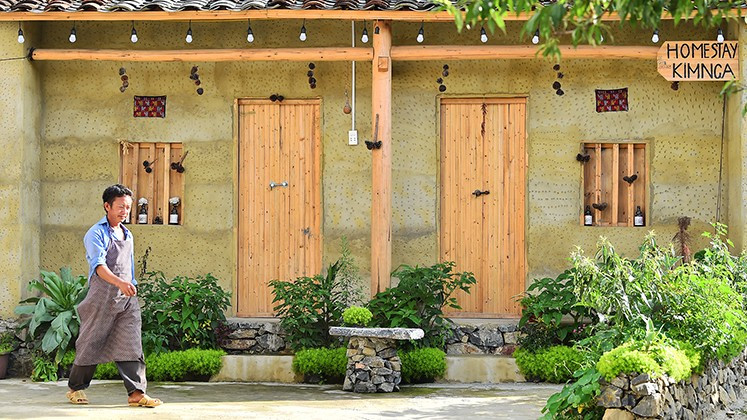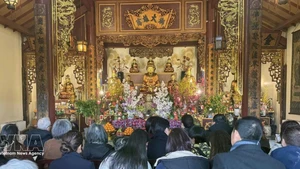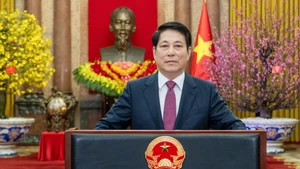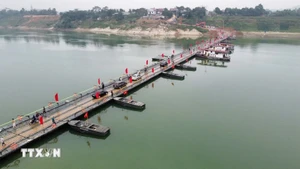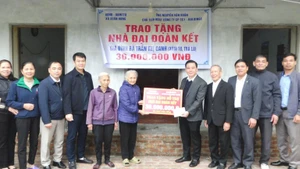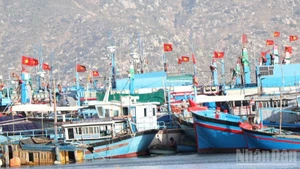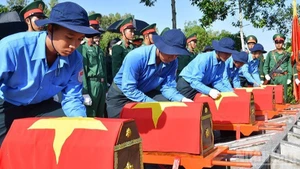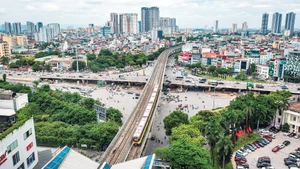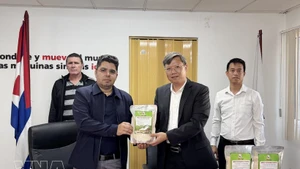According to data from the Vietnam Bank for Social Policies (VBSP) of Dong Van District as of October 31, the total outstanding loans of policy credit programmes in the district reached 427.9 billion VND, with over 9,000 customers having outstanding loans.
Policy credit funds have been invested in all communes and towns in the district, targeting the right beneficiaries in a timely and transparent manner while creating favourable conditions for poor people and policy beneficiaries with needs and eligible conditions to access funds.
Opening the door to tourism development
Like many ethnic minority women, Thao Thi Dinh (from Lao Xa Village, Sung La Commune, Dong Van District) previously only knew how to rely on the rocky mountains, doing all kinds of work from animal husbandry, farming, to working in China, but life remained difficult.
“Looking back at recent years, with more tourists coming, my husband and I decided to change our lives and try tourism. When starting the homestay, I was worried because we lacked everything — knowledge, skills, experience, and especially capital. Fortunately, with encouragement and advice from the commune women’s union and bank officials, I boldly borrowed money to open a homestay named ‘Doi Da’ (Stone Life),” said Dinh.
With such determination, Dinh went to the district centre to learn about homestay operations, then taught herself design, guest services, cooking, guest interaction and more. Through the Women’s Union of Sung La Commune, she and her husband borrowed policy credit funds totalling 150 million VND through two programmes: loans for poor households, and loans for clean water and rural environmental sanitation.
The borrowed money, along with the family’s own capital, was invested in purchasing furniture, equipment, and facilities for the homestay. “Since starting operations in early 2023, the homestay hasn’t generated much income yet, but it has helped improve the family’s economic situation somewhat. Additionally, I have the opportunity to meet and interact with domestic and international tourists, learning many new things,” shared Dinh.
Similarly, Sung Mi Phin from Lung Hoa B Village (Sa Phin Commune, Dong Van District) was also very excited when talking about his homestay business. “Previously, like my grandparents and parents, I only knew how to grow rice and raise livestock, but it wasn’t getting us anywhere. So, I decided to establish the ‘Chai To’ Homestay with the desire to bring new experiences to tourists.
Officially welcoming guests since 2019, I introduced various activities to the homestay services such as: visiting mountain fields, exploring rock-based agriculture, collecting firewood, cloud hunting, cultural exchange, enjoying white H’Mong flute music, and experiencing mountainous cuisine. These activities are very popular among tourists who are passionate about exploring and experiencing local life,” Phin said.
Supporting Sung Mi Phin and his wife is the preferential loan from VBSP. “With access to policy credit, young people like my wife and I have more motivation and confidence to develop our homestay. In the future, we plan to expand the homestay and create a tourism area combined with a farm stay to serve domestic tourists, and we hope to access additional loans from VBSP to make this dream a reality,” Phin added.
Additional support from policy
According to Hau Mi Say, Chairman of the Sa Phin Commune People’s Committee, previously, people’s livelihoods in the commune relied solely on farming and animal husbandry. Later, when it was determined that tourism development was needed for economic growth, Sa Phin Commune was designated as one of Dong Van District’s tourist areas. Implementing this policy, the district has issued programmes to preserve traditional H’Mong houses and tourist sites in the commune such as the Vuong family mansion, the moon rock field, and others.
In this spirit, aiming to maximise the effectiveness of policy funds for tourism development, the commune has guided more than 20 households to access loans for tourism with total outstanding loans of over one billion VND. Along with other resources, social policy credit plays a particularly important role for ethnic minorities and poor households in the area, creating livelihoods, promoting socio-economic development, and improving people’s material and spiritual lives.
In practice, over the years social credit policies have been widely implemented, creating breakthroughs for people to overcome difficulties, actively engage in production for socio-economic development, promote tourism, eliminate hunger, reduce poverty, and build new rural areas.
In Dong Van specifically, although it is still a poor district with very limited budget resources, in addition to policy capital, the district annually allocates resources from its budget to balance and supplement loan capital and support and create all conditions for the district’s VBSP office to perform its duties. To date, Dong Van District has transferred nearly 6.5 billion VND to the district’s VBSP for lending to poor households and policy beneficiaries.
All of this has confirmed that after 10 years of implementation, Directive 40 issued by the Party Central Committee’s Secretariat in 2014 on strengthening Party leadership over social policy credit has truly taken root in local communities. Dong Van District Chairman Do Quoc Huong emphasised, “The issuance and implementation of Directive 40 is a correct policy, it is especially suitable for poor districts and districts in particularly difficult regions such as Dong Van.”
Nguyen Van Huyen, Director of Dong Van District VBSP Office, shared that it is currently conducting lending, debt collection, interest collection, and deposit taking at all 19 commune transaction points according to a fixed monthly schedule (including weekends).
This has helped bring policy credit directly to the poor and policy beneficiaries, while reducing travel costs for people and creating conditions for people to access and become familiar with banking services. The public disclosure of Party and State preferential policies, lending procedures, and borrower debt right at the commune level has created conditions for local authorities, socio-political organisations, and people to know and implement together, while simultaneously monitoring and supervising policy credit activities.
Another support to make the policy even more solid came when the Party Central Committee’s Secretariat issued Directive 39 in October 2024 with the aim to improve the effectiveness of social policy credit in the new phase. This new regulation will help enhance the effectiveness of social policy credit, affirming the determination to achieve the goal of becoming a high middle-income country by 2030.
